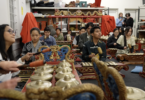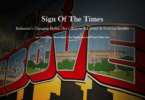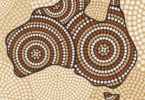Political parties may be misfiring by focusing their attentions on issues typically considered to be “feminine”.
Public debate suggests women are feeling alienated by government policies that focus on childbearing, saying the family is no longer their sole focus.
Melbourne feminist collective, Cherchez La Femme, say the women’s vote is not the same as the family vote. Issues which gained traction during the recent election campaign included issues such as parental leave and childcare. But are our politicians really tuned in to the concern of the modern day woman?
“Women traditionally vote on health care, education and climate change,” said panellist and former Crikey editor-in-chief, Sophie Black.
“It’s important to make the distinction between addressing women and badging women with all of the same concerns,” she said.
The panel discussion, titled Feminism and the Election, and spearheaded by creator Karen Pickering, debated the influence of the women’s vote in the election and argued that the female concerns were not solely focused on reproductive issues or childcare.
“[Politicians are] still so bad at targeting the women’s vote,” said panellist Celeste Liddle.
“So often it’s juxtaposed with the family vote and drawcards like parental leave and childcare neglect the diversity of Australian women,” she said.
Karen Pickering, feminist writer and Guardian columnist, told City Journal exclusively that while women may have a particular set of concerns, they should not be pigeonholed inside them.
“Issues affecting women affect everyone,” she said.
“It may be that women voters consider areas like health, education and climate change very important, and those issues are also the most crucial for progressives, though there are other considerations for women, like reproductive rights, that affect us differently.”
With Julia Gillard almost entirely forgotten by the current media, Australian women are left at the whim of our two male dominated political parties.
Holding 51 per cent of the vote and in light of Obama’s successful campaign targeting, of the female vote, it seems it would be wise for Australia’s political parties to pay close attention to the call of the woman.
“I do not feel that either of the main parties represents my interests,” said attendee Jane Marx.
“Personally, however, the issues that I will be paying the most attention to are asylum seeker policies, housing affordability and the carbon tax.”
Marx said discussing the Australian political landscape from a feminist perspective was more topical than most young women would imagine and provided an opportunity to explore important social issues.
“Labor’s recent lurch to the right has left me with grave concerns about the direction this country is heading in. I attended in an attempt to escape the general feeling of disengagement and political apathy that I feel in most of my social circles,” she said.
The monthly meeting of Cherchez la Femme was well-attended and included panellists Karen Pickering and co-panellists: Sophie Black (former editor-in-chief of Crikey, Director of the Adelaide Festival of Ideas), Tanja Kovac (human rights lawyers, national co-convenor of Emily’s list, founder of Human Right are Aussie Rules), Celeste Liddle (Daily Life, Guardian Australian, Rantings of an Aboriginal Feminist).






